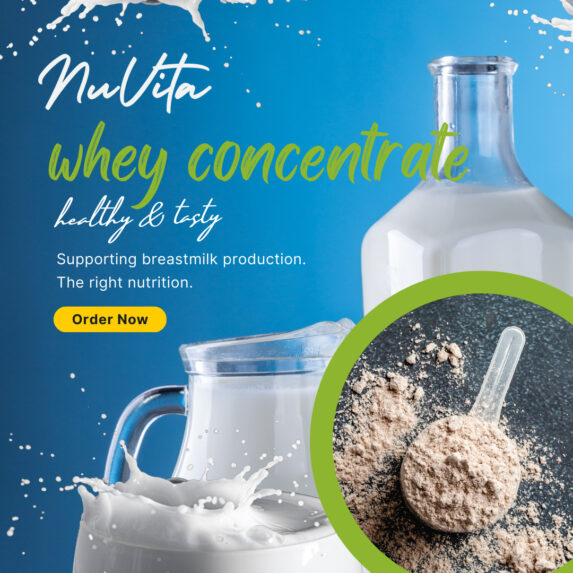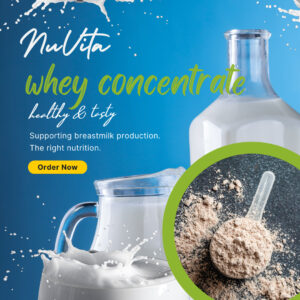Nuvita Whey Concentrate for Breastfeeding (1kg)
R590.00
About Product
Whey concentrate is an affordable option and contains a small amount of fat and lactose, which can actually be beneficial for some people. Nuvita’s pharma grade whey concentrate is a valuable source of amino acids containing 80% protein and 7% lactose, making it digestible for persons who are lactose intolerant.
Nuvita Whey Concentrate for Breastfeeding (1kg)
Our pure whey protein concentrate (WPC) is a high-quality pharmaceutical grade protein supplement that is derived from milk. It is a complete protein source that contains all essential amino acids necessary for the growth and maintenance of the human body. Whey protein is known to have many benefits, including increasing muscle mass, aiding in weight loss, and improving immunity. Some studies have also suggested that consuming whey protein may increase milk production in breastfeeding mothers.
Breast milk production is regulated by a complex interplay of hormones, including prolactin, oxytocin, and estrogen. Prolactin is the primary hormone responsible for milk production, while oxytocin helps to release milk from the breast. Both hormones are stimulated by the baby’s suckling and the mother’s response to the baby’s needs.
Studies have suggested that consuming whey protein may increase the levels of prolactin in breastfeeding mothers, which in turn can lead to increased milk production. A study published in the Journal of Applied Physiology in 2000 found that consuming whey protein increased the levels of prolactin in healthy women. Another study published in the Journal of Nutrition in 2011 found that consuming whey protein increased the levels of prolactin in lactating rats.
Nuvita Whey Concentrate contains 80% protein, and 7% lactose, making it highly absorbable and easily digestible for persons who are lactose intolerant.
Choosing Between Concentrate & Isolate
Whey isolate and whey concentrate are two types of protein supplements that are derived from milk. The main difference between them is the level of processing and the resulting protein content.
Whey isolate is a more processed form of whey protein, where most of the non-protein components such as fat, lactose, and other minerals are removed. As a result, whey isolate contains a higher percentage of protein per serving compared to whey concentrate, typically around 90% or more. This makes it a good option for people who are looking for a high protein supplement without the added fats or carbs.
On the other hand, whey concentrate is a less processed form of whey protein where some of the non-protein components are retained. Whey concentrate typically contains around 70-80% protein per serving and also contains some lactose and fat. This makes it a good option for people who want a more balanced protein supplement and don’t mind the added carbs and fats.
In summary, whey isolate is a more pure form of protein with a higher protein percentage and minimal lactose and fat, while whey concentrate is a less processed form of protein with a lower protein percentage and some lactose and fat.
Pharmacological Action of Whey
The two main functions of whey protein are to stimulate protein synthesis and to stimulate the immune system (e.g. in cancer patients). For older people, aging causes a decline in protein synthesis that inevitably leads to disability and death (” cachexia”). Recent studies have shown that amino acids derived from high quality proteins such as whey protein, are able to stimulate regeneration of lost proteins (J Clin Invest, May, 1998). Apart from being a source of dietary amino acids, whey has numerous other benefits which
Contra indications
Persons with severe kidney failure should not be taken whey unless under the supervision of a medical practitioner.
Dosage
Take 1 tablespoon 2-3 times per day, dissolved in water or fresh fruit juice.


